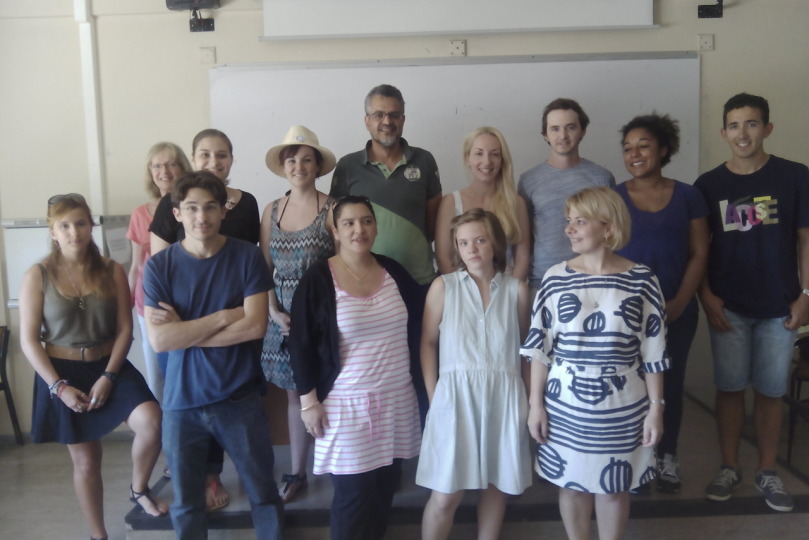- A
- A
- A
- ABC
- ABC
- ABC
- А
- А
- А
- А
- А
- HSE University
- Faculties
- Faculty of Humanities
- School of Linguistics
- News
- 'I‘d never thought I would have to work so hard!'
The School of Linguistics was founded in December 2014. Today, the School offers undergraduate and graduate programs in theoretical and computational linguistics. Linguistics as it is taught and researched at the School does not simply involve mastering foreign languages. Rather, it is the science of language and the methods of its modeling. Research groups in the School of Linguistics study typology, socio-linguistics and areal linguistics, corpus linguistics and lexicography, ancient languages and the history of languages. The School is also developing linguistic technologies and electronic resources: corpora, training simulators, dictionaries, thesauruses, and tools for digital storage and processing of written texts.
Digital Humanities
Bangkok: Association for Computational Linguistics, 2024.
In press
Yakovleva A., Kosheliuk N., Moroz G.
International Journal of Bilingualism. 2026.
In bk.: BivalTyp: Typological database of bivalent verbs and their encoding frames. .
arxiv.org. Computer Science. Cornell University, 2024

'I‘d never thought I would have to work so hard!'

When, during our first class of Russian as a Foreign Language (RFL) we were told about an opportunity to teach Russian in Nice, I didn’t really believe that these words would come true. But in spring, the Nice Sophia Antipolis University really did invite students of the School of Linguistics to participate in its summer school, and I met the selection criteria: I had a high grade in RFL and spoke French. I was lucky enough to be chosen, and throughout the whole of July I taught Russian on an intensive course. In addition gaining valuable experience, I was reimbursed for the visa, the tickets, accommodation was provided, and I received15 Euros a day.
Three languages were taught on the summer school, French, English, and Russian. Of course, those interested in learning Russian were the fewest: only 16 people. They were divided into two groups: complete beginners, and a continuing group. The latter included people with different levels of proficiency, which made it harder to teach.
I taught four hours a day, a total of 15 classes. The students were very diverse: they included professionals with medical, technical, or philological degrees, students, and those who had graduated long ago. It was funny that I was younger than all of my students, and the oldest student was a 67-year-old lady, who came to the Cote-d’Azur from Paris for the Summer School. It seemed as though there were only two reasons for my students to start learning Russian: interest in the Russian culture, and/or interest in selling various souvenirs to Russian tourists.
Since I had no teaching experience, I did not teach alone, but worked in a pair with a local instructor, and each of us taught two hours a day in each of the groups. Since the classes took place every day, I had to prepare for them every day as well. Before the summer school, I had no idea how hard it is to teach on an intensive course! I was keen to make the classes interesting and lively, but it was sometimes difficult to make it happen. Coming back from a class, I immediately started thinking about the next one, and it felt like I never had enough time. In addition to that, the choice of the textbook was not the best, and I had to gather materials from various resources, all of which took a lot of effort. Of course, the local instructor, Irina, helped me a lot, but still it was hard. I‘d never thought I would have to work so hard!
Although I spent most of my leisure time preparing for the classes, I managed to travel a little bit: I visited Antibes, where a jazz festival was taking place, and Monaco. My impressions of Monaco were rather negative: it seems that there is at least one unfriendly policeman for every citizen in this city, and also it’s hot and everything is expensive there. But I liked both the festival in Antibes and the city itself. Nice sometimes looks like a Russian resort city in France: it’s very hot, there are a lot of tourists, and it sometimes seemed that I hadn’t left my homeland, since there were a lot of Russians there.
As I had visited France many times before, I didn’t discover much about French people this time, but instead I realized how well the system of communication between students, lecturers, and study offices works here at HSE.
Despite some of these challenges, I have positive feelings about this trip. I’m happy I got some experience of teaching RFL now, before my graduation. The students in both groups were very good, and generally I was satisfied with my classes. Yet, if I had a chance to teach such classes once again, I would do many things differently. For example, I would use different video and audio materials and would pay more attention to grammar. However, the students were satisfied and even asked whether I would teach at the summer school next year. And you know what? I wouldn’t mind!
- About
- About
- Key Figures & Facts
- Sustainability at HSE University
- Faculties & Departments
- International Partnerships
- Faculty & Staff
- HSE Buildings
- HSE University for Persons with Disabilities
- Public Enquiries
- Studies
- Admissions
- Programme Catalogue
- Undergraduate
- Graduate
- Exchange Programmes
- Summer Schools
- Semester in Moscow
- Business Internship
- © HSE University 1993–2025 Contacts Copyright Privacy Policy Site Map
- Edit

